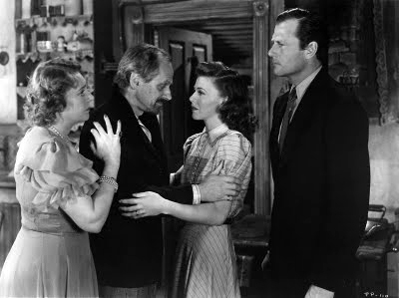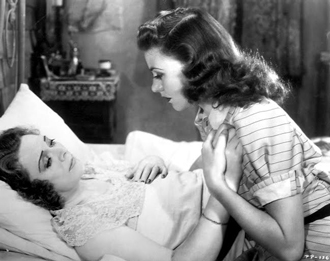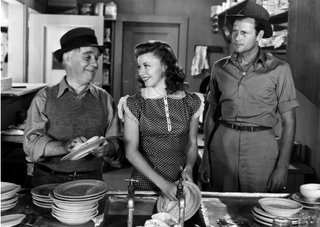
 |
|
|
|
Ginger Rogers adds another feather to her post-Astaire career cap with Primrose Path, an insightful and sweet story about life on the wrong side of the tracks in Monterey, California. Director Gregory La Cava's production takes on a loaded topic at the height of the Production Code's restrictive powers. Prostitution is a vice said to "be always with us", yet the movies were dead set on protecting the morals of the country by refusing to really knowledge its existence -- bargirls, good time girls, and gangster's molls tended to be portrayed so vaguely or glamorized so thoroughly that a reasonably sheltered young person might easily not fully understand what they're supposed to represent. The Production Code ignored the reality of impoverished, abandoned and powerless women doing whatever they must to survive; boys and girls taken to church on Sunday were just told to stay away from bad places and bad people. 
Thus we have the main character in Primrose Path, who, thanks to the consummate gentle approach of the underrated Gregory La Cava, lives in a household supported (barely) by her mother, a good-time girl who disappears for weeks at time with various mysterious gentlemen. Young Ellie May (Rogers) lives in denial of her mother's activities. She deals with the painful, repressed reality by de-sexualizing herself. Dressed more or less like a boy, she refuses to play the girlie game. The intelligent Ellie May loves her father, an alcoholic wreck, and is quick to throw rocks at neighborhood boys, even before they can taunt her about her mother. But she's eighteen years old, and love comes her way when she doesn't expect it. The handsomely designed RKO film establishes that the Adamses, living in a veritable shack up in the Mexican neighborhood of Primrose Hill, are the lowest of the low. Mother Mamie (Marjorie Rambeau) spends most of her time up the coast with "Mr. Hawkins" (Charles Lane), and Ellie May's educated but unemployed father Homer (Miles Mander) has responded to the situation by staying drunk and spending his days passed out on his bed. That leaves the household to be run by Grandma (Queenie Vassar), a bitter and envious old woman who was surely a good-time girl herself, thirty years before. Granma is passing on her selfishness and insolence to Ellie May's intolerably obnoxious little sister Honeybell (Joan Carroll). Honeybelle has already learned to steal food from the Mexican neighbors and to back up Granma's hateful lies. Depressed that her father is in such a state, Ellie May hitchhikes to the beach to dig clams and meets some very interesting people. Gramp (Henry Travers of It's a Wonderful Life) runs a greasy spoon, and his main counterman is the quick-witted Ed Wallace (Joel McCrea). Ed tells jokes and makes backhanded wisecracks about Gramps' food to entertain the customers. The handsome Ed also attracts the "Portugee" girls from the canneries, and the girls attract the male customers. Ellie May's new friends aren't rich, but they're refreshingly ethical and fair with one another. 
Ellie May at first tries to steal Ed's wallet, but a ride home results in a stolen kiss that turns her head. She tries to dress up to impress Ed at the Bluebell Café and tells a lie to get him to marry her. It's an idyllic relationship, until Ellie May's past catches up with her, and her spiteful Grandma makes trouble. Ed is crazy about his bride, but his outlook darkens when he learns of her background and misconstrues the reasons behind her untruths. Primrose Path is another Gregory La Cava romantic idyll, this time rooted in an all-too convincing reality. Nobody seems to be particularly rich but the Adamses live like genuine white trash, in a house unfit to receive strangers. The poison is in the heritage passed on from Granma to Mamie. Granma only wants the money and goodies Mamie brings in, while Mamie seems to have, by necessity, split her personality. She mothers the helpless, pitiful Homer, who pretends that he's working on his translations of ancient Greek. Everything else at home is completely out of control, which means that Honeybelle is growing up without schooling and getting set to repeat her mother's lifestyle. Ellie May is independent. When she dolls herself up (rather incompetently) to be feminine for Ed, Granma assumes she's going out to hook somebody and bring the money home. Ellie May's new "family" down at Gramp's Diner is a joy that includes togetherness, fun, hard work and time to be human. The smart-mouthed Ellie May slips comfortably into the role of stand-up comedian with her new husband, and earns the affection and respect of all of her customers. When a mistake causes a patron to be accused of insulting Ellie May, the other customers rise as a unit to defend her. 
The Cannery Row milieu fits in well. The "Portugee Girls" are really local Mexican Americans, the prettiest of which are popular dates down at the Bluebell. They dance and drink but they're good Catholics and no looser than other locals; but it's assumed that they're not good marriage material for a handsome guy like Ed. Even acknowledging that social barrier, the situation is idyllic: the girls like Ed because he's handsome and witty, not because he has money. The dramatic events of the second half of the film are best not detailed here. Granma repeatedly sabotages Ellie May's marriage, and some terrible things happen at home (some mandated by the Production Code). The show ends with a hopeful and healthy sign, but no instant cure surfaces for the troubles up on Primrose Hill. La Cava's movie puts some weight behind the idea that loving concern can bridge a lot of social calamities, and a single positive personality can change a family's future for the better. Gregory La Cava's films never make jokes for their own sake... the movie has plenty of humor but the feelings and problems of the characters always come first. Ginger Rogers is great as a teenager in a flop hat and sweatshirt, trying to look younger than she is (at age 29). She also pulls off the difficult task of making Ellie May smart but inexperienced, depressed but capable of a personal makeover. Joel McCrea is as charming as ever and exudes integrity. But he's also got the capacity to be hurtful and closed off. It's a beautiful expression of a marriage under unusual strain. Marjorie Rambeau was nominated for a supporting Oscar for her role; she also appears in Frank Borzage's great Man's Castle. Mamie's fellow good-time girl Thelma is played by Vivienne Osborne, who we noticed in a star performance as a manipulating harpy back in the old Edward G. Robinson drama Two Seconds. Stage actress Queenie Vassar made only a couple of movies. She makes such a strong impression that we have to remind ourselves that she's acting, and not a hateful monster. Henry Travers is once again a wonderful calming presence as Gramps. We like the fact that his gentle words help Ellie May and Ed to get along, even if they think they're ignoring his advice. 
The Warner Archive Collection DVD-R of Primrose Path is a very good transfer of this 71 year-old picture, which appears to have been filmed on Southern California beaches - not enough windy trees are present to be Monterey. The show is an unexpected favorite; I think I like it because it respects its characters so thoroughly, and creates a good feeling about people in general. No extras are included in Warner's package. Being "led down the Primrose Path" is a phrase I have heard a lot, but have never really asked what it meant. One source says that it suggests that "one is being deceived or led astray". The path being discussed, then, is an attractive one that turns out to be a slippery slope toward moral laxity.
On a scale of Excellent, Good, Fair, and Poor,
Primrose Path rates:
Reviews on the Savant main site have additional credits information and are often updated and annotated with reader input and graphics. Also, don't forget the 2010 Savant Wish List. T'was Ever Thus.
Review Staff | About DVD Talk | Newsletter Subscribe | Join DVD Talk Forum |
| ||||||||||||||||||